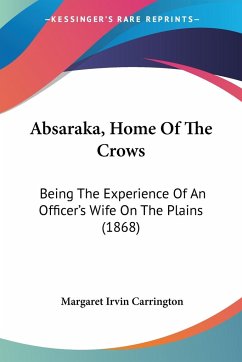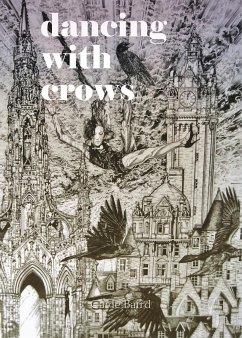
Absaraka, Home Of The Crows
Being The Experience Of An Officer's Wife On The Plains (1868)
Versandkostenfrei!
Versandfertig in 1-2 Wochen
29,99 €
inkl. MwSt.

PAYBACK Punkte
15 °P sammeln!
On July 17, 1866, two soldiers and six wagoners were killed by Sioux Indians. In the next two weeks, fourteen more men died in Sioux attacks. The attacks continued through the summer and fall. On December 21, disaster struck. Recklessly pursuing Indians across a wooded ridge, Brevet Lieutenant Colonel William Fetterman and his company fell into an ambush. It was the worst military blunder of the Indian Wars before the Battle of the Little Big Horn ten years later. Margaret Irvin Carrington, like many officers' wives, kept a journal of her stay in the outposts of the West. She recorded her impressions of the scenery and the inhabitants of Absaraka, in present-day Wyoming, Montana, and the western Dakotas. As the wife of the commander of Fort Phil Kearny, Colonel Henry B. Carrington, she experienced the sequence of events and the heightening of tensions that led to that bloody December day. She could not have known that her journal would come to such a shocking climax, with her husband's career at stake.
Absaraka, Home of the Crows is a memoir written by Margaret Irvin Carrington in 1868. The book chronicles her experiences as an officer's wife on the Great Plains during the late 19th century. Carrington provides a vivid and detailed account of life on the frontier, including encounters with Native American tribes such as the Crow and Sioux, and the challenges of living in a harsh and unforgiving environment. She also offers insights into the social and cultural dynamics of the time, including the roles of women and the impact of westward expansion on the indigenous populations. Through her personal anecdotes and observations, Carrington provides a unique perspective on a pivotal moment in American history.This scarce antiquarian book is a facsimile reprint of the old original and may contain some imperfections such as library marks and notations. Because we believe this work is culturally important, we have made it available as part of our commitment for protecting, preserving, and promoting the world's literature in affordable, high quality, modern editions, that are true to their original work.












